FAQs
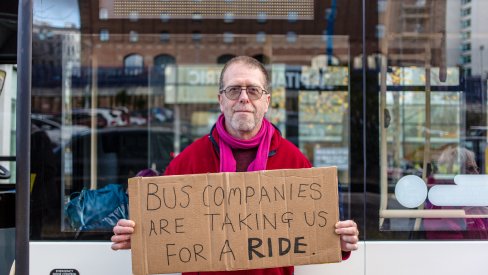
Will private operators still set fares?
No. Fares will be set by Greater Manchester combined authorities, which will bring them down.
Bus fares in urban areas outside of London (which is regulated) continue to go up. Our fares have gone up by 55% above inflation in the last ten years, which is a joke.
Will private operators still be responsible for timetables, routes and bus stops?
No. All timetables, routes, and bus stops will be regulated by the Greater Manchester combined authorities and Transport for Greater Manchester.
Photo credit to Athena Mellor
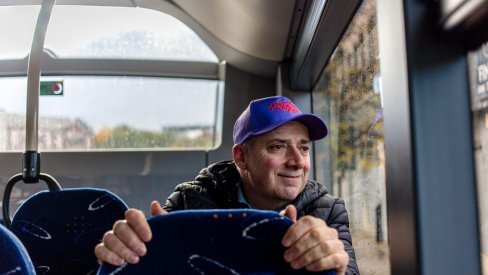
Why hasn’t Manchester done it already? Why is this so important now?
Andy Burnham, Mayor of Greater Manchester, was given the power to regulate the network last year through the Bus Services Act, though this has been planned as part of the 2014 devolution deal. It's one of the biggest powers Andy has as the Mayor of Greater Manchester.
We're not campaigning for publicly owned buses. It was made illegal to set up new municipally owned bus companies in 2017. We're campaigning to bring our buses back into public control!
Previous authorities that investigated regulating their bus networks faced legal challenge from the operators. In Tyne and Wear, this forced the authorities to give up their plans to take control of buses on behalf of people, however that was before last year’s Bus Services Act. The new legislation is less ambiguous. It allows local authorities to pull together a more robust case for regulating their networks, by forcing bus companies to share their data. With the legislation having been signed last year, now the process can move forward. We need to tell Andy Burnham that we care about better buses to make sure he makes the right decision.
Andy Burnham said back in December: “Yes, we will be moving ahead with the powers we have with plans to re-regulate the buses.”
“We can have a regulated system like London. Their system is light years ahead of ours."
It’s more important than ever that you show your support for a regulated bus network that works for you.
Manchester could lead the way, for other cities to follow, creating the world class bus system that Mancunians deserve.
Photo credit to Athena Mellor
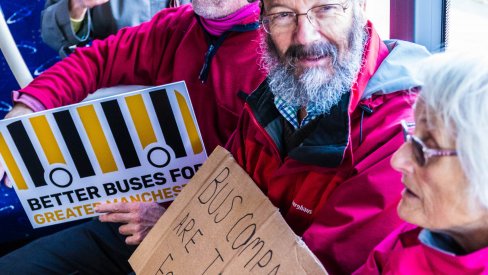
How will regulation, or franchising, help congestion?
If you needed more evidence for franchising, look at successes in our own city, like the Leigh Guided busway. The contract was tendered out to a private bus operator to fulfil a need, and 97% of people would recommend this quicker route to a friend or relative. Various councils were invested in this scheme, which allowed bus lanes to be created and prioritised, which made the service the quick and efficient service that everyone loves so much.
Manchester’s congestion is the worst in the UK outside of London. It is a big issue, but more bus lanes could be one of the many solutions which contributes to people getting out their cars and onto buses. As the Mayor of Bogota said "a bus with 80 passengers has a right to 80 times more road space than a car with one."
It is local authorities and the traffic commissioner who have the power to set up bus lanes. If councils were regulating the bus network and they were being held to account on their performance, it would be in their incentive to introduce more bus lanes, which would allow for much quicker journeys. Right now, introducing bus lanes is difficult, and people are understandably reluctant to do this without assurance that this bus lane will be used by a bus company. With bus services being run on a contract basis, authorities will know in advance whether a service is going to run for 5-10 years. This would also mean the network will be more stable! You can trust a service will run for years rather getting caught out; with what we have now, routes will be cancelled with only 70 days notice.
We need to provide better alternatives to cars for people and a world class bus network is one of the ways of doing that. As we have seen, deregulation has not delivered the bus network we need to tackle congestion and allow people to live more active lifestyles. Sign the petition to call for better buses in Greater Manchester.
Photo credit to Athena Mellor
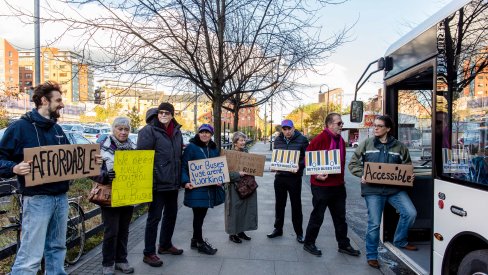
What about partnerships? Won’t bus companies do this voluntarily?
Partnerships are voluntary agreements between bus operators and local authorities, which can be backed out of and do not have to be agreed if the operator doesn’t want to agree it. This means that bus operators continue to run buses how they want. Councils have no authority or power to force operators to run any service or guarantee fares.
It is this deregulation that we are calling to an end by asking Andy to choose a regulated or ‘franchised’ bus network. Deregulation was an experiment, carried out on populations of 30,000 before being rolled out across the whole of the UK, except London.
This is because it was deemed too risky for London. You need to show your support for reregulating the buses now more than ever.
Bus operators are worried about their profit margins and shareholders, so Stagecoach are offering shiny new hybrid buses.
First are rolling out contactless payments. And this is good.
However, we think that these moves are designed to say: don’t do franchising. Bus companies have even been accused of holding Greater Manchester council to ‘ransom’. Stagecoach’s own CEO Mark Griffiths has said that if franchising goes ahead, the cost of the e-bus scheme they have proposed ‘would be borne by the taxpayer’. They have also threatened to launch legal challenge before on cuts to public funds they get, from our taxes.
‘Cashless payment options’, ‘allowing people to sit back and enjoy the ride’ are easy enough, but we deserve more than this and we can get this and more through a regulated network. We need a properly integrated and planned network, cheap fares and regular reliable services, all of which we’ve seen little of during 30 years of deregulation and partnerships.
We know that Manchester’s routes are profitable, and that this profit would be better reinvested back into our public purse, not making bus companies richer. Let not lose this chance to finally have a bus system that works for us; tell Andy Burnham we want a regulated network.
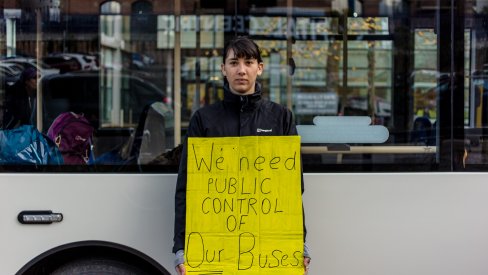
How do I have any more of a say? How is regulating, or franchising, more accountable? How will we be able to make operators do any of this?
Private operators will have to compete and re-apply for contracts every five to ten (or more) years and will only have their contracts renewed if they meet high performance standards for safety, reliability, customer satisfaction, and cleanliness.
Buses right now sometimes just don’t turn up and we hear stories of buses going !poof! into thin air on our ‘real time’ travel apps. Right now, a bus operator can cancel or change a service with 70 days’ notice, but what if you’ve bought a yearlong travel card, and how do you get to work or the hospital? With regulation, Manchester council can ask operators to stick a pre-decided timetable and hold them to account if they don’t.
This is backed up by a report by IPPR: ‘Franchising also allows greater democratic accountability over fares, services and routes, and makes smart-ticketing and data-sharing more viable.'
Your service would effectively be controlled by your council. You could use existing democratic processes to get your voice heard by those who represent you and make sure that the bus services are providing what you need.
Regulation also means more competition, accountability and ultimately efficiency, as bus operators compete to run different routes, as it’s done in London, for the duration of a contract and if they don’t meet standards, then the contract is offered to another operator.
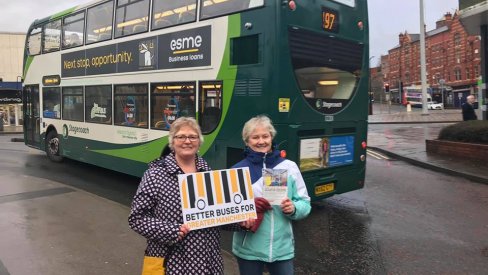
How will franchising make buses better for riders with accessibility needs?
In the UK, people with mobility difficulties make 42% fewer trips than people with no mobility difficulties.
At the current rate of decline, passenger numbers will drop 10% from 2010-22, but trips by elderly and disabled people will fall by nearly a fifth.
The current state of buses is not good enough in Greater Manchester for users with accessibility issues and we think this has been worsened by our deregulated bus network which means we have little control over our bus network.
We have not been able to force bus companies to introduce audio-visual announcements for example. Their multiple ticketing apps are hard to use many tell us. Priority for wheelchair users is not offered in practice, and passengers often complain of buses driving past them as there is not enough space. This cannot continue.
If we regulate our buses, we would be able to appeal to Local authorities and use our existing democratic processes to speak to our representatives within the council to make these much-needed changes. Currently, we have little accountability for complaints as well as little influence on bus companies to improve standards of accessibility. We think this democratic control over our buses, coordinated by the local authorities will mean we can get quick and effective accessibility improvements.
Some minimum standards and ways that control over our buses could improve accessibility are:
- Disabled user involvement in procurement: we need to tell bus companies that they cannot purchase buses unless they have consulted disabled users. Disabled people need to be involved in the procurement process as this is the only way buses will become more accessible.
- High quality disability awareness training and an ongoing commitment to refresh this training
- Accessible buses: we need to have minimum standards for the fleet. There is a lot to improve upon.
- Involvement in all transport planning: We need to involve disabled users in all aspects of transport planning from the start of the process, not once the main plans has been sketched and cannot be changed much. We want minimum standards for disabled user involvement in all stages of a journey, from planning to ticket purchasing, to customer service, right through to getting off the bus.
- We need audio-visual announcements.
- There should be free companion passes for care workers of disabled people.
These are some suggestions but Greater Manchester's Coalition of Disabled People has a Transport Manifesto which should be followed within months of getting public control of our buses. This will lead to more people being able to ride buses and a better experience for everyone.
Regulation of buses has improved accessibility, with further to go now.
In London, passenger interest is represented at the highest level and this appears to have improved access to buses for users. London’s buses are not perfect but they have gone some way, for example with their range of accessible maps.
In Jersey where their buses are regulated, they have been able to introduce a simple smartcard ticket which allows users to pre-top up cards to make travelling simpler, plus a card which signals to drivers (and could even signal to other passengers) your accessibility needs, for those with and without invisible disabilities. Henshaws society for the blind introduced this card in Manchester, but many tell us that these have not been taken up by bus company managers at all, with drivers not knowing what they are. On Liberty Bus, wheelchair users are given one-to-one training on using the bus, as are drivers who are given training on helping users with accessibility needs.
Liberty buses survey showed that over 30% of disabled passengers said their confidence and their mobility had improved as a result of using the bus service.
Bus companies admit that they need to be compelled to deliver accessible buses.
One bus industry professional said to the Government’s Transport Committee:
“On accessibility in the north-east, if you want to run a registered local bus service, your bus has to be fully accessible, so our fleet in the north-east is fully accessible.”
We need to demand more for passengers. At the moment, we have no control over commercial bus services in Greater Manchester, which make up 80% of services. We need to be able to specify what we need in terms of training and bus specifications.
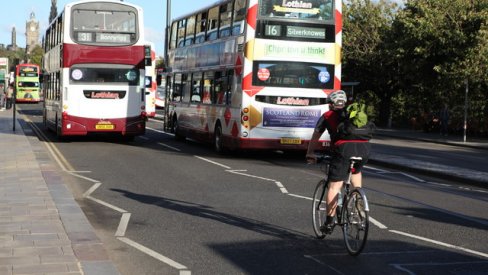
What about cyclists?
Even cycling is better under a regulated bus network.
In London, it is compulsory that drivers from all operators have taken cycle awareness training, whereas in Manchester, this is optional. If the bus network was regulated, Manchester council could ensure that this was necessary to any operator running a service in your city.
Join the call for a pubicly controlled, regulated network now by signing the petition.
Photo used under Creative Commons licensing, thanks to Calum McRoberts.
Who pays for it?
Regulating the network, according to research by Transport for Quality of Life, has the power to generate savings of £340 million annually. This is due to the capturing of excess profit, as bus companies are commissioned on a contract basis to deliver specific services which is far more cost efficient.
The efficiency that comes from one body designing the network, as is done in London and Jersey, allows local authorities to expand the network and use extra money for more evening and weekend services. TfGM could introduce a simple smartcard ticketing scheme with a daily cap on spend, and reduce fares. Regulation also allows profits from busy routes to subsidise other needed but less busy routes.
Could it get too political?
Transport for Greater Manchester have over 20 years of experience in delivering Manchester’s transport network. They have a wealth of knowledge on how to do this.
As long as TfGM are able run operations with a sufficient amount of separation from local bodies and local politics, they can stick to the work of delivering a great network, which can be prevented from getting too politicised.
Further cuts to local bus funding from central government cannot be ruled out, but TfGM have enough experience of this. Furthermore, they would have enough control over the network to ensure that profits made in some areas could bridge as many gaps as possible. This would be a far better use of public money than what we have now.
To join the call for publicly controlled, accountable buses, sign the petition.
